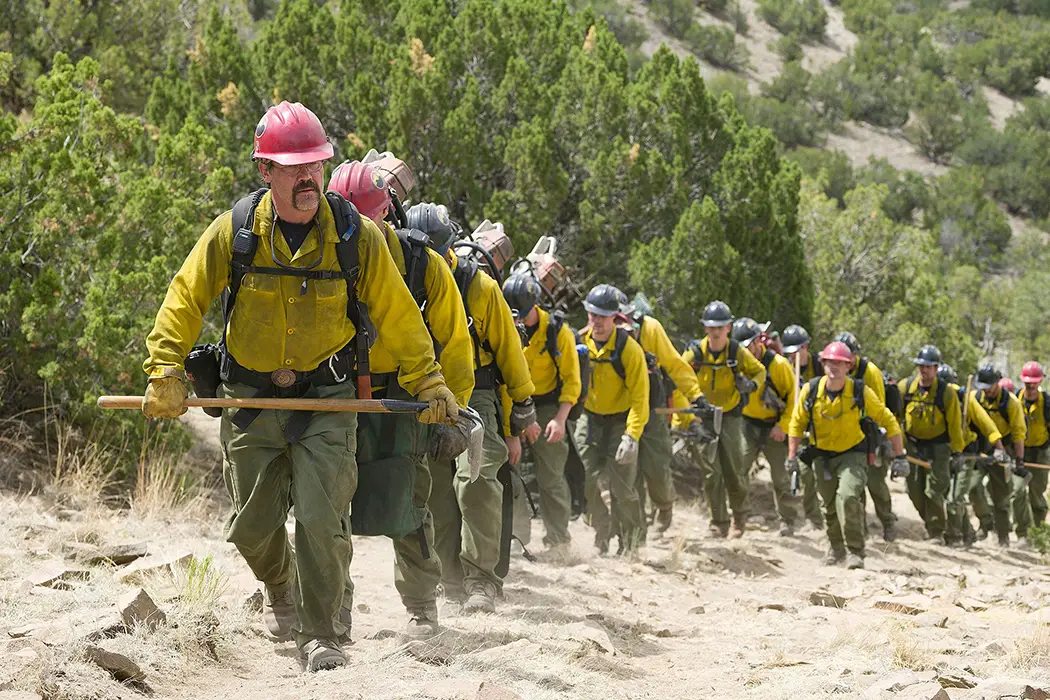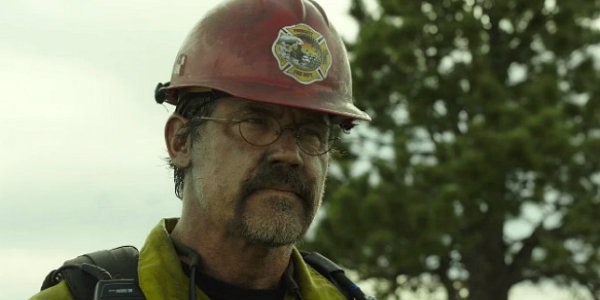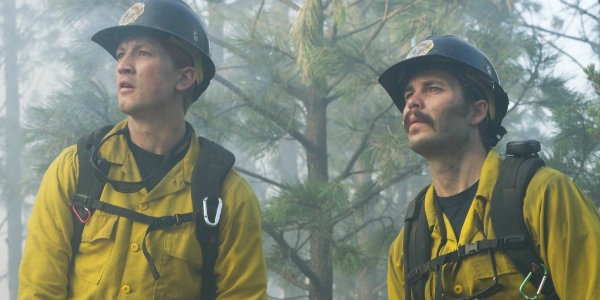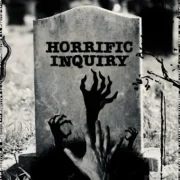ONLY THE BRAVE: A Missed Opportunity Hellbent On Heroism

Midwesterner, movie lover, cinnamon enthusiast.
Sometimes a movie comes around that surprises you. Underneath the corporate veneer it promises, it touts a significant message you didn’t know you signed up for. Only the Brave is not that film, but it should’ve been. A biographical account of Arizona wildlife firefighters, based on the GQ article “No Exit” by Sean Flynn, it has all of the pieces to be a timely, subversive drama about man’s relationship with nature, but instead leans into a traditional and hollow narrative about valor.
The film, directed by Joseph Kosinski, presumably because Peter Berg was busy, follows a crew of firefighters that extinguish wildfires without the use of water. They spend days out in the wilderness like a modern pack of cowboys. Their leader, Josh Brolin’s Eric, is an archetypal masculine hero. He’s stubborn but forgiving; ego-driven but has a big heart. Eric is juxtaposed with Miles Teller’s Brendan. Their trajectories, in relationship to each other, drive the film’s emotional narrative. Brendan is a drug addict who needs a way out of his shitty life, and Eric is the one to give him a shot. As you can imagine, they teach each other equally important life lessons along the way.
Boys Will Be Boys
Only the Brave is basically about dudes hangin’ out with other dudes; it’s perfectly content to relish the firemen troop as a blue collar, all-male convent. They razz and josh each other, tease one another about sexual trysts, but ultimately, they have each other’s backs. It’s typical fare that perpetuates a hegemonic masculinity.
And then, oddly, the last act of the film slowly starts to push back against some of the unsavory ways these men talk about women — as something “to close.” When one of the fighters talks about a woman he’s started seeing, his language suggests that he’s decided to talk about women as actual people. There’s a few other small hints like this that make it seem like the film’s trying to say something larger about hypermasculinity and the destructive dialogue that gestates in working environments like the firefighters’ troop, but ultimately it doesn’t commit to anything substantial.
Further, this type of third-act revelation for a character is perfectly fine so long as the actual film wasn’t relishing their previous behavior. The first two acts of the film actively delight in the machismo of the fighters. At one point, there’s literally a close-up of one of them opening a Budweiser with a chainsaw. About an hour into the movie I was wondering if the whole point of the movie wasn’t simply to watch manly men do manly things together.

This rampant “boys will be boys”-ness of the majority of the film doesn’t make for a fun trip to the cinema. It’s not that watching manly men do manly things together, in the abstract, isn’t an unproven method for good movies. Top Gun and Point Break, for instance, are driven by a wonderful homosociality that has garnered them classic status. Only The Brave, however, isn’t willing to indulge the same loving buddy-ness or homoeroticism. Instead, each man is required to have either an ongoing heterosexual relationship or an interest in one.
Unsurprisingly, most of the women in the film are there in service to the men. Probably the worst instance, but the best representation of what Only the Brave thinks of women comes late in the second act. After Brendan gets bitten by a rattlesnake, he’s taken to the hospital. Eric comes into the operating room to check on him, and one of the nurses, who is literally saving Brendan’s life, looks at Eric before he leaves the room and says, “Thank you for what you do. You’re a hero.” The tone-deaf misogyny of this moment is astounding. And though it’s a small little one-off comment, these types of scenes steal any credibility from the movie when it’s trying to bolster the men’s attempts to talk about women respectfully.
Traditional Gender Dynamics
At its core, Only the Brave reinforces traditional gender dynamics. Women want kids and know how to take care of kids. Men don’t know how to take care of kids and don’t really care as much to have them. Men are much more comfortable saving the world. In other words, men should be out in the world working while women nurture the family. This antiquated ethos is reaffirmed throughout the film.

However, Jennifer Connelly’s character is given a much fairer shake. She’s basically there to cut Brolin down to size, and Connelly’s performance makes their relationship feel lived-in. Although she upholds the idea that women’s ultimate happiness lies in having a child, she consistently puts his masculine ego in check. Also, she’s given interesting bits of screen time, like when she tells Eric a funny story about peeing her pants. Albeit a small moment, little bits like that can round out a character, giving them an agency that makes them seem more than two dimensional. If only the film had that kind of commitment to the rest of its female cast, instead of putting all of its equality eggs in one basket.
Only The Brave: Hollow Heroics
Only the Brave’s story also has the perfect makings for a meaningful exploration on man’s relationship with nature. I wasn’t aware of the actual outcome of this story and figured the movie was primed to weave a tale about man’s power over nature. The ending, seeing their bodies under protective covers like a field of baked potatoes wrapped in foil, was devastating. And seeing Brendan be the lone survivor to walk into a room full of wives waiting to see whether their husbands made it back alive is harrowing in concept, and surely punishing to many viewers. And watching Connelly’s character comfort him, even while she’s grieving, should be a moving moment of humanity.
Additionally, before this last fire, Brendan said he would quit his position in order to be a more present participant in his marriage, and to presumably start a family. That he died right after making this decision could have spoken to the sad futility of his work, and further, to the impotence of man’s pride. But Only The Brave squanders any potential to say something profound by getting caught up in regurgitating a flaccid story about heroism that we’ve been spoonfed since Sept. 11, 2001.
Walking out of Only the Brave I couldn’t help but think about how squarely this story fits inside Werner Herzog‘s wheelhouse. This film could’ve been about man’s ego demolished by nature and the foolishness of the pride to think otherwise. That movie would’ve been powerful, and more than a lousy attempt to reassure audiences of the innate goodness of men. The title of Only the Brave’s source material is telling: “No Exit.” I wish I could’ve seen a movie that wasn’t afraid to broach the honesty that title suggests. The film we were given isn’t about bravery.
Am I being too harsh on Only the Brave? Let me know in the comments.
Only the Brave is now playing in the U.S. and opens in the U.K on Nov. 10, 2017.
Does content like this matter to you?
Become a Member and support film journalism. Unlock access to all of Film Inquiry`s great articles. Join a community of like-minded readers who are passionate about cinema - get access to our private members Network, give back to independent filmmakers, and more.













